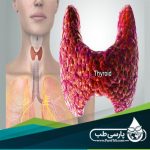Thyroid problems: When your thyroid does not work properly:
- Are you suffering from fatigue, weight gain or hair loss?
- Are you Anxious?
All of these can be a cause of thyroid gland’s problems.
The thyroid gland plays a vital role in your body and the activity of many organs dependent on the proper functioning of this gland:
 What is thyroid gland?
What is thyroid gland?
The thyroid gland is a butterfly in the front of the neck. This gland produces hormones that control your metabolism and regulate the energy you need.
Thyroid gland disorders may interfere with the production of thyroid hormones. Due to the effect of thyroid hormones on the metabolism of the body, the disruption of the activity of this gland causes a wide range of symptoms.
 Weight Gain or weight Loss
Weight Gain or weight Loss
An unexplained change in weight is one of the most common symptoms of thyroid disease.
Weight gain may be due to a low level of thyroid hormones but a loss weight may be a signal of excessive level of thyroid hormones.
The first one is known as hypothyroidism and the second is called hyperthyroidism.
 Swelling in the neck and thyroid gland area
Swelling in the neck and thyroid gland area
Swelling of the neck can be due to underarm or hyperthyroidism, which can lead to goiter in its more advanced stages.
Of course, the swelling of the neck region can have many reasons, and some cancers include it.
So, it is better for you to see your doctor immediately if you see this sign and do the necessary tests.
 Chang in heart rate
Chang in heart rate
Thyroid hormones affecting various organs of the body can also affect the health and function of the heart.
Hyperthyroidism usually increases your heart rate and blood pressure.
Change in body energy or emotional moods
Thyroid disorders can have a significant impact on your energy and mood.
Hypothyroidism tends to make people tired, slow and depressed. Hyperthyroidism can also cause anxiety, sleep problems, boredom and irritability.
 Hair loss
Hair loss
Hair loss is another symptom that can be a sign of thyroid hormones imbalance. Both hypothyroidism and hyperthyroidism can cause hair loss.
In most cases, when the thyroid disease is treated, the hair grows also treated.
Feeling too cold or hot
 Thyroid disorders can interfere with the ability to regulate the body’s temperature.
Thyroid disorders can interfere with the ability to regulate the body’s temperature.
People with hypothyroidism may have a feeling of cold or chill. But this is different in people with hyperthyroidism, they are constantly sweating and feel hot.
Other symptoms of hypothyroidism:
- Dry skin and brittle nails
- Numbness the hands
- Constipation
- Irregular menstrual periods
Other symptoms of hyperthyroidism:
- Muscle weakness or hand shaking
- Problems of vision
- Diarrhea
- Irregular menstrual periods
 Parsi Teb Physical and Mental Health Journal
Parsi Teb Physical and Mental Health Journal 








